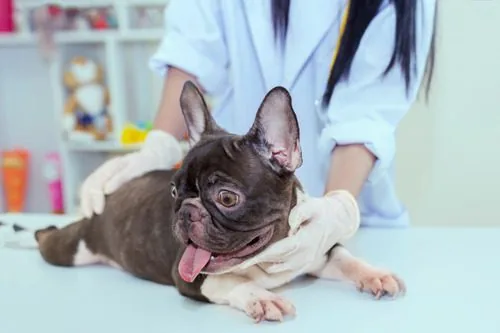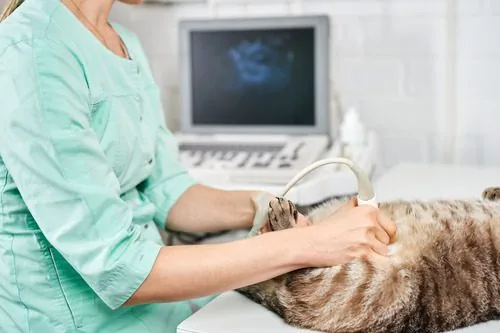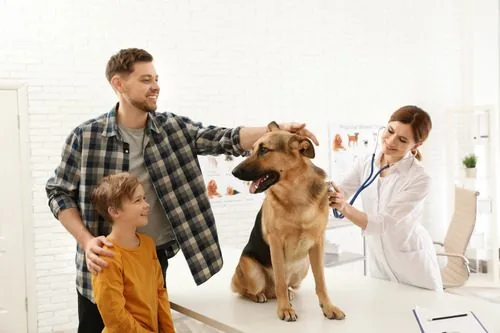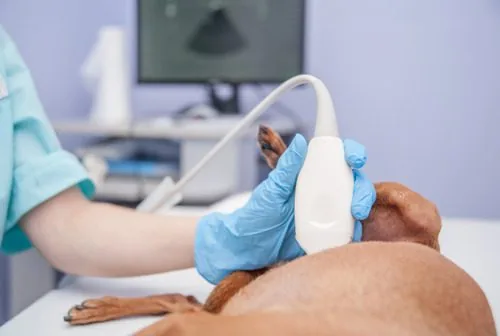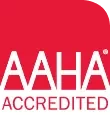My Dog Ate Gum: Is This an Emergency?
Dogs are naturally curious creatures, and sometimes their inquisitive nature can lead them to ingest potentially harmful substances. One such substance that might be found in many households is chewing gum. So, is it an emergency if my dog eats gum?
If your dog eats gum, you should call your veterinarian for further guidance. If possible, have the gum pack handy in case the vet asks you for important information regarding the ingredients of the gum. Remember to remain calm and take your veterinarian’s advice.
In this article, we will discuss the dangers of gum ingestion in dogs and provide guidance on what to do if your dog consumes gum.
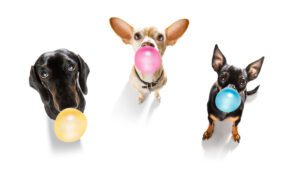
Why is Gum Dangerous for Dogs?
The primary concern with gum ingestion in dogs is the presence of a sugar substitute called xylitol. Xylitol is a common ingredient in sugar-free gum, and it’s extremely toxic to dogs. When ingested, xylitol can cause a rapid release of insulin, leading to a dangerous drop in blood sugar levels (hypoglycemia). In severe cases, xylitol poisoning can also result in liver failure.
Symptoms of Xylitol Poisoning in Dogs
If your dog has ingested gum containing xylitol, they may exhibit the following symptoms:
- Vomiting
- Loss of coordination
- Weakness or lethargy
- Tremors or seizures
- Rapid or irregular heartbeat
- Collapse
These symptoms can develop within 30 minutes to several hours after ingestion. If you notice any of these signs in your dog, it’s crucial to seek immediate veterinary attention.
What to Do if Your Dog Ate Gum
If you suspect that your dog has eaten gum, take the following steps:
Assess The Situation
Check the gum packaging or product information to determine if it contains xylitol. Not all gum products contain this toxic ingredient, and the severity of the situation will depend on the specific type of gum your dog has ingested.
Call Your Veterinarian or Emergency Pet Clinic
Regardless of whether the gum contains xylitol, it’s essential to contact your veterinarian or an emergency pet clinic for guidance. They can provide advice on the appropriate course of action based on the specific circumstances of your dog’s ingestion.
Provide Information
When speaking with a veterinarian, be prepared to provide information about the gum product, such as the brand, ingredients, and the estimated amount consumed. This information will help the veterinarian assess the potential risks and determine the appropriate treatment.
Follow The Vet’s Advice
Your veterinarian may recommend bringing your dog in for an examination and treatment, or they may provide instructions for monitoring your dog at home. Be sure to follow their advice closely and keep a close eye on your dog for any signs of distress or symptoms of xylitol poisoning.
How to Keep Your Dog from Eating Gum
To prevent gum ingestion incidents, store gum and other products containing xylitol in secure cabinets or drawers that are out of your dog’s reach. Educate family members and guests about the dangers of xylitol for dogs and ask them to be vigilant about keeping gum and other potentially toxic items away from your pet.
What Are The Risks for Canine Gum Ingestion
While xylitol is the primary concern when it comes to gum ingestion in dogs, there are other potential risks and complications to consider. These include gastrointestinal blockage, choking hazards, and adverse reactions to other gum ingredients.
Gastrointestinal Blockage
Large quantities of gum can cause gastrointestinal blockages, particularly if the gum is swallowed in large pieces or combined with other foreign objects. Blockages can lead to serious complications, including vomiting, abdominal pain, constipation, and even perforation of the intestines.
Choking Hazard
Dogs may choke on gum, especially if they attempt to swallow it whole or if the gum becomes lodged in their airway. Choking can lead to difficulty breathing, coughing, gagging, and, in severe cases, a lack of oxygen.
Reactions to Other Ingredients
Some dogs may have adverse reactions to ingredients in the gum other than xylitol, such as artificial sweeteners, flavors, or colors. These reactions can vary in severity and may require veterinary attention if they cause significant distress or discomfort.
Conclusion
If your dog has eaten gum, it could potentially be an emergency, particularly if the gum contains xylitol. It’s essential to assess the situation, contact your veterinarian for guidance, and monitor your dog closely for any symptoms of xylitol poisoning. By acting quickly and following your veterinarian’s advice, you can help ensure the best possible outcome for your dog.
Additionally, take steps to prevent future incidents by securely storing gum and other xylitol-containing products out of your dog’s reach. Educating those around you about the dangers of xylitol for dogs can also help to protect your pet from accidental ingestion.
If you are near Winter Haven, FL and your pet is facing a veterinary emergency, Veterinary Healthcare Associates is here to help. Give us a call at (863) 324-3340 today!
Recent Posts
Why You Should Build Your Veterinary Career at Veterinary Healthcare Associates
Why You Should Build Your Veterinary Career at Veterinary Healthcare Associates Embarking on a veterinary career is…
French Bulldog Nose Surgery: Everything You Need to Know
French Bulldog Nose Surgery: Everything You Need to Know French Bulldogs are adored for their playful personalities…
Veterinary Diagnostic Imaging: How It Keeps Pets Healthy
Veterinary Diagnostic Imaging: How It Keeps Pets Healthy When it comes to protecting your pet’s health, veterinary…
How Much Does Hyperbaric Oxygen Therapy (HBOT) for Dogs Cost?
How Much Does Hyperbaric Oxygen Therapy (HBOT) for Dogs Cost? When your dog is facing a health…
Cat Sonogram & Ultrasound: Everything You Need to Know
Cat Sonogram & Ultrasound: Everything You Need to Know Cats have a way of concealing discomfort, making…
About Veterinary Healthcare Associates
Veterinary Healthcare Associates in Winter Haven, FL, was established over 30 years ago as Maxwell Animal Clinic by Dr. John Maxwell. Maxwell Animal Clinic was a one-doctor general practice offering preventive care, dentistry, and standard surgical services to the community. As the years passed, Maxwell Animal Clinic evolved into a thriving 10-doctor general, specialty referral, and emergency veterinary practice.


